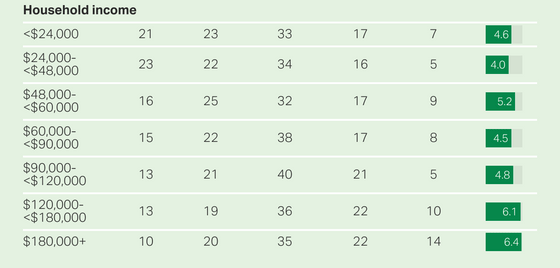Survey results are reported that greeting 'hello' to six neighbors on a regular basis maximizes happiness

Greetings such as 'Good morning' and 'Hello' are very important for building smooth human relationships.
Saying Hello Linked to Higher Wellbeing, but With Limits
https://news.gallup.com/poll/509543/saying-hello-linked-higher-wellbeing-limits.aspx

Gallup surveyed 4,556 American adults about their happiness in life. Happiness is indicated with 0 as the lowest and 100 as the highest. In addition, happiness is composed of five elements: career happiness, social happiness, economic happiness, physical happiness, and community happiness.
According to Gallup, happiness is closely related to the number of neighbors you regularly greet. Below is a graph showing the number of neighbors I greet regularly and their happiness score. Happiness was 51.5 points when no one greeted anyone, but the score increased as the number of people increased, reaching a maximum score of 64.1 points when greeting six neighbors. On the other hand, there was no significant increase in score beyond that.

The five elements included in happiness also correspond to the number of people exchanging greetings, and ``career happiness'', ``community happiness'', ``social happiness'', and ``physical happiness'' greet six neighbors. “Financial well-being” peaks when you greet 11-15 people on a regular basis.

Of the 4,556 people surveyed, 27% reported greeting six or more neighbors. In addition, the number of people exchanging greetings varies greatly by age, with those under 30 greeting an average of 2.9 people, while those over 65 greeting an average of 6.5 people. Furthermore, it was reported that the percentage of people who exchanged greetings with 6 or more neighbors remained at 14% for those under the age of 30, but increased to 41% for those aged 65 and over.

Gallup predicts that 'region of residence' is the factor that increases the number of people who greet elderly people. According to Gallup, younger people are more likely to live in urban areas where their neighbors are less friendly, while older people are more likely to live in suburbs, small towns and rural areas where they are more likely to exchange greetings with their neighbors. thing.
In addition, in households with children under the age of 18, the average number of people greeting each other increases to 6.1 compared to other households.
In addition, the number of neighbors who exchange greetings changes depending on the income of the household, and in the case of households with an average annual income exceeding $ 120,000 (about 17 million yen), they regularly exchange greetings with 6 or more neighbors. became clear.

``It's easy to predict that interaction with neighbors increases social well-being, but it's worth noting that it's related to other factors,'' Gallup said. ``Regularly greeting your neighbors not only has a positive impact on your social life, but it can have a number of effects on different aspects of your overall well-being.''
Related Posts:
in Science, Posted by log1r_ut







